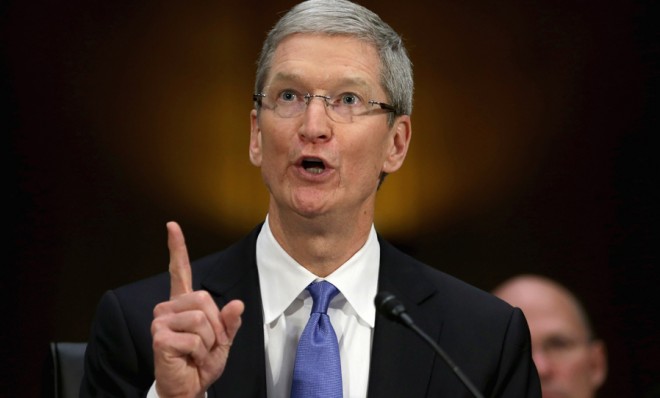How an Apple affiliate made $30 billion and paid no taxes
It helps to have affiliates with no employees in low-tax Ireland


A free daily email with the biggest news stories of the day – and the best features from TheWeek.com
You are now subscribed
Your newsletter sign-up was successful
Apple CEO Tim Cook defended the tech giant's tax strategies before a Senate panel on Tuesday, saying that Apple is proud to be an American company. "We pay all the taxes we owe — every single dollar," Cook said. "We don't depend on tax gimmicks." Cook faced harsh questioning, however, from the members of the Senate Permanent Subcommittee on Investigations, which unveiled a report Monday accusing Apple of using a "complex web" of offshore shell subsidiaries to avoid paying taxes on $74 billion in profits earned overseas between 2009 and 2012.
How did Apple do that?
The heart of the Apple tax-avoidance scheme, the Senate investigation found, is a single subsidiary that is registered in Ireland — Apple Operations International (AOI). The Irish affiliate made $30 billion in profits over those four years, and didn't pay a dime in taxes — not to Ireland, not to the U.S. "Apple went to Ireland," says Neil Irwin at The Washington Post, "and it found a pot of gold."
The Week
Escape your echo chamber. Get the facts behind the news, plus analysis from multiple perspectives.

Sign up for The Week's Free Newsletters
From our morning news briefing to a weekly Good News Newsletter, get the best of The Week delivered directly to your inbox.
From our morning news briefing to a weekly Good News Newsletter, get the best of The Week delivered directly to your inbox.
Why didn't AOI owe any taxes?
The affiliate is incorporated in Cork, Ireland. Under U.S. law, that means it's subject to taxes in Ireland, not the U.S. But Irish law says a company should pay taxes to the country where its managers are, and the Apple subsidiary is run from the corporation's headquarters in Cupertino, Calif. That's where 32 of AOI's last 33 board meetings took place, which means the subsidiary doesn't have to pay taxes to either country.
How much of Apple's business goes through Ireland?
All of Apple's global sales go through AOI, which was set up in 1980 in Ireland, a low-tax country that gives Apple special treatment in the form of a negotiated 2 percent tax rate. AOI accounted for 30 percent of Apple's profits from 2009 to 2011. Another Irish subsidiary, Apple Sales International, earned $38 billion and paid $21 million in taxes in the same period, giving it an effective tax rate of 0.06 percent. When the income of all of Apple's affiliates in Ireland is tallied up, the company managed to shield $74 billion in profits from taxation from 2009 through 2012.
A free daily email with the biggest news stories of the day – and the best features from TheWeek.com
What other purported tricks does Apple use?
The structure of AOI is just the beginning. Apple also lists much of its intellectual property as belonging to its ghost affiliates in Ireland. "Think of it this way," says Neil Irwin at the Post. "If you live in, say, Germany and buy an iPhone, you are buying a physical object that was assembled in China from parts that come from all over. But you are also buying a piece of the intellectual property of Apple," developed by designers, programmers, and marketers in California. Apple, however, avoids paying California's high tax rates on much of that expense, by sharing the cost of research and development with its Irish subsidiaries.
And that's legal?
Yes. "No one is suggesting that any of these techniques are illegal," says Henry Blodget at Yahoo Finance. "No one is suggesting that Apple is doing anything that any number of other massive multi-national companies aren't doing. And no one is suggesting that companies should voluntarily pay more taxes than they absolutely have to pay... But boy are Apple's tax-dodging techniques effective." And the U.S. tax code is, perhaps, equally as ineffective.
Sources: CNBC, Quartz, The Washington Post (2), Yahoo Finance
Harold Maass is a contributing editor at The Week. He has been writing for The Week since the 2001 debut of the U.S. print edition and served as editor of TheWeek.com when it launched in 2008. Harold started his career as a newspaper reporter in South Florida and Haiti. He has previously worked for a variety of news outlets, including The Miami Herald, ABC News and Fox News, and for several years wrote a daily roundup of financial news for The Week and Yahoo Finance.
-
 The environmental cost of GLP-1s
The environmental cost of GLP-1sThe explainer Producing the drugs is a dirty process
-
 Greenland’s capital becomes ground zero for the country’s diplomatic straits
Greenland’s capital becomes ground zero for the country’s diplomatic straitsIN THE SPOTLIGHT A flurry of new consular activity in Nuuk shows how important Greenland has become to Europeans’ anxiety about American imperialism
-
 ‘This is something that happens all too often’
‘This is something that happens all too often’Instant Opinion Opinion, comment and editorials of the day
